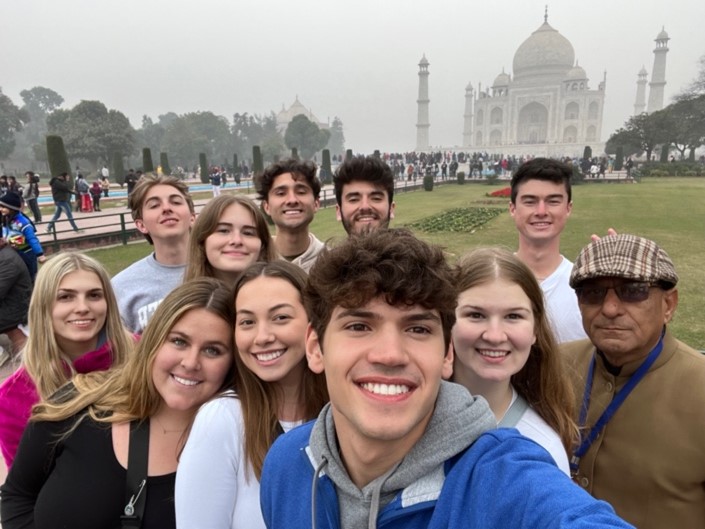Parents, guardians and families play a critical role in their student’s international experience. Your support and ongoing communication with your student, both before and during their program, can be an instrumental in creating a memorable part of their student's Chapman experience.
Off
Study Abroad
Family Resources
- Follow
»Family Resources

Scholarships and Funding
Explore specific global education scholarships and funding outside of Chapman to supplement
existing financial aid.

Health and Safety
Your student's health and safety are our top priority. Learn more about the steps
they can take before and while abroad to ensure a safe abroad experience.

Explore Programs
With a number of different program types and locations, we work with your student
to ensure their study abroad experience complements their academic goals.
Benefits of Studying Abroad
While abroad, students are faced with a multitude of new experiences while managing life amongst a new culture that can positively improve their academic, personal and professional skills. Students returning from their study aborad experiences often feel more confident, independent and more mature. You can always contact the Center for Global Education at globaled@chapman.edu or (714)997-6830 to learn more.
Read more at the U.S. Department of State Information for Parents.

Ellie Hoskins
University of Roehampton, Fall 2023
"London is an amazing place to study and live, but also an amazing place to visit!
While studying abroad, chances are you’ll have some friends and family who’ll want
to come see you and the cityMy family and I had an amazing time in London and getting
to show them around (and do some things I hadn’t done yet!) made me love London even
more."

Noah Monnich
Semester at Sea, Spring 2023
"The people I met on my voyage have become lifelong friends whom I consider to be
my ‘forever people’. After the voyage it felt like I knew these people for a lifetime.
For my voyage, we were the first voyage to have access to WhatsApp without using your
daily internet. It connected the students across the ship and gave us the ability
to talk to...
More Information for Families
Toggle Section
Assurances from the Center for Global Education
- All programs have been vetted by Chapman University on the basis of academic quality, cultural immersion and safety. Safety can never be guaranteed, but the CGE believes that ongoing reviews of our program offerings and careful selection can help to mitigate risk.
- The CGE will send information and communication to student applicants throughout the study abroad experience: before, during and post-program. We will also communicate with students’ program, host institution and faculty as needed.
- All students attend a mandatory Pre-Departure Orientation to prepare them for their term abroad. This includes a health and safety video from the Dean of Students office.
- The CGE hosts an optional Family Pre-Departure Orientation each semester in English and Spanish. Details will be sent to students, who are asked to invite their families. For those family members who cannot attend, the CGE sends students a link to a recorded version to send to their families.
- The CGE is in communication with our partners in the U.S. and abroad who monitor potential social and political unrest and provide your student with instructions regarding how to respond safely if needed. Students should download and activate AlertTraveler App for real time updates.
- The CGE provides the contact information for our programs including emergency numbers available to students for ongoing support or emergency needs.
- You can contact the Center for Global Education during regular university hours. In case of an emergency after hours, call Public Safety at (714) 997-6763.
- The CGE seeks to empower your student to handle most situations independently, but may choose to involve the students’ emergency contact during emergencies. Parents can expect support and timely responses whenever they seek out the CGE’s expertise in situations.
Suggestions for Family Involvement and Collaboration
- Discuss with your student their goals and expectations for their chosen program.
- Seek to understand how the program impacts your students’ academics upon their return to Chapman.
- Assist your students with financing and budgeting concerns. Create a plan using the Budget Worksheet, which will be given to all students when they apply. Contact the CGE if you cannot locate the Budget Worksheet in your application or on the Global Gateway brochures.
- Understand how FERPA laws affect what universities and the CGE can and cannot share
with
parents and guardians (i.e., certain legal protections regarding the release of personal
information for adult participants affect what the CGE is able to share). - Encourage your student to take the lead in the planning and execution of this time
abroad,
but provide support when they face inevitable challenges adjusting to a new environment. - Discuss any independent travel plans and activities not included in their program,
and strongly
encourage your student to notify on-site staff of upcoming travels in case of emergency.
Additional Suggestions
- Engage your student in a thorough discussion of safety and behavioral issues, as well
as the
Chapman Student Code of Conduct. In particular, speak frankly about the use of alcohol and
illegal drugs while abroad, as the use thereof is the number one factor in on-site emergencies
and personal crises abroad. - Encourage your student to disclose any mental health, physical health, or disability accommodations early on. Laws, services, and medications can be different overseas. If students disclose early, we can work with them to determine the best fit program and location.
- Establish a communication plan with your student as to when and how often to be in
contact
while abroad. Be aware with the time difference, phone service, and internet connections,
communication may not be as frequent as in the U.S. - If your student encounters a challenging situation, encourage your student to bring
up issues
and concerns directly to their on-site staff (e.g., roommate concerns, academic issues, cultural
adjustment problems, etc.). The skills students gain by addressing and solving their own
challenges are incredibly valuable and transferable soft-skills they can use later in life! Strive
to balance the concerns of the student with the advice and expertise shared by their program
and U.S. staff. - Coordinate with your student if planning to visit the host country so as to not conflict
with class
schedules, exams, or excursion dates and special events included in their program. We
recommend that you visit at the end of the program if you are going to visit. At the start of the
program, it is important for students to participate in orientation activities and navigate a new
educational system and city with their peers and support from on-site staff to build their
confidence and independence.
